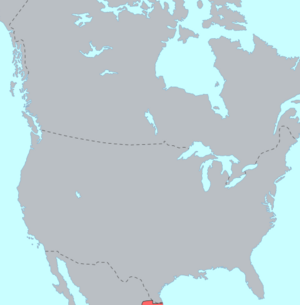Comecrudan languages facts for kids
Quick facts for kids Comecrudan |
|
|---|---|
| Geographic distribution: |
Rio Grande Valley |
| Linguistic classification: | Hokan ?
|
| Subdivisions: |
—
|
 Pre-contact distribution of Comecrudan languages. (Distribution continues to the south.)
|
|
The Comecrudan languages were a group of languages once spoken in the southern part of Texas and northern Mexico. They were found along the Rio Grande river. Comecrudo is the most famous language from this group. Sadly, we don't know much about these languages or the people who spoke them. Most of what we know comes from lists of words collected by missionaries and explorers from Europe. All Comecrudan languages are now extinct, meaning no one speaks them anymore.
Contents
What Languages Were in the Comecrudan Family?
Experts believe the Comecrudan family included three main languages:
All of these languages are now extinct.
How Are These Languages Related?
For a long time, people have wondered how Comecrudan languages might be connected to other languages.
In 1891, a researcher named John Wesley Powell grouped Comecrudo with Cotoname and Coahuilteco languages. He called this larger group "Coahuiltecan."
Later, in 1915, John R. Swanton suggested an even bigger group. He thought Comecrudo, Cotoname, Coahuilteco, Karankawa, Tonkawa, Atakapa, and Maratino might all be related.
In 1920, Edward Sapir agreed with Swanton's idea. He even suggested that this large "Coahuiltecan" group might be part of an even bigger language family called Hokan.
More recently, in 1979, a linguist named Goddard looked at new information about the Garza and Mamulique languages. He found enough similarities to believe they are truly related to Comecrudo. However, he didn't think the other proposed connections (like with Karankawa or Atakapa) were strong enough.
Another researcher, Manaster Ramer (1996), supported Powell's original idea of a "Coahuiltecan" group (which he called Pakawan). He also thought Karankawa was likely related and Atakapa might be a more distant relative. But other experts, like Campbell, have questioned these ideas. They think some similar words might just be borrowed from one language to another, not proof of a deep family connection.
Words That Show Connections
The table below shows some basic words that are similar across the Comecrudo, Garza, and Mamulique languages. These similarities are what led Goddard (1979) to believe they are part of the same language family. The only records we have for Mamulique and Garza come from notes by Jean-Louis Berlandier.
| Comecrudo | Garza | Mamulique | meaning |
|---|---|---|---|
| al | ai | atl | 'sun' |
| eskan | an | kan | 'moon' |
| apel | apiero | – | 'sky' |
| na | knarxe | kessem | 'man' |
| kem | kem | kem | 'woman' |
| apanekla | axe | aha (?) | 'water' |
| aaul | aie | – | 'road' |
See also
 In Spanish: Lenguas comecrudas para niños
In Spanish: Lenguas comecrudas para niños
- Native American languages
- Classification of indigenous languages of the Americas
- Atanaguaypacam Indians from the Handbook of Texas Online
- Coahuiltecan
 | Victor J. Glover |
 | Yvonne Cagle |
 | Jeanette Epps |
 | Bernard A. Harris Jr. |

